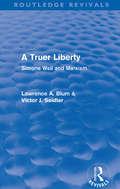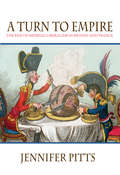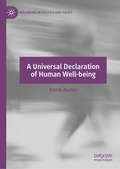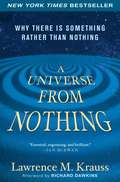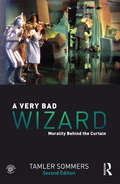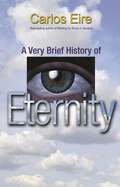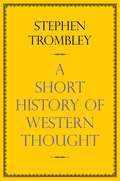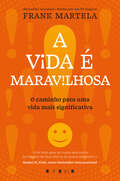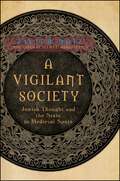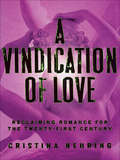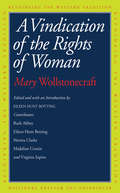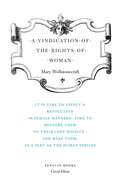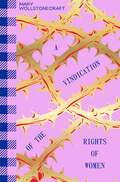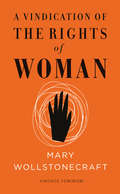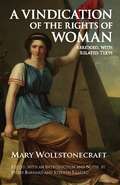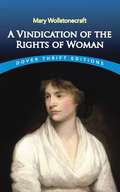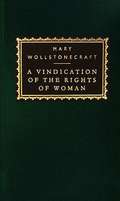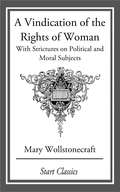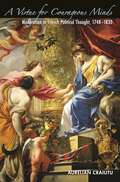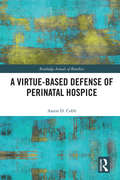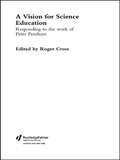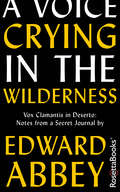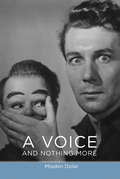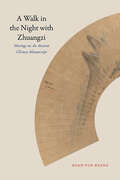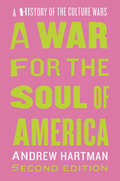- Table View
- List View
A Truer Liberty: Simone Weil and Marxism (Routledge Revivals)
by Victor Seidler Laurence A. BlumSimone Weil — philosopher, trade union militant, factory worker — developed a penetrating critique of Marxism and a powerful political philosophy which serves an alternative both to liberalism and to Marxism. In A Truer Liberty, originally published in 1989, Blum and Seidler show how Simone Weil’s philosophy sought to place political action on a firmly moral basis. The dignity of the manual worker became the standard for political institutions and movements. Weil criticized Marxism for its confidence in progress and revolution and its attendant illusory belief that history is on the side of the proletariat.Blum and Seidler relate Weil’s work to influential trends in political philosophy today, from analytic Marxism to central traditions within liberal thought. The authors stress the importance of Weil’s work for understanding liberation theology, Catholic radicalism, and, more generally, social movements against oppression which are closely tied to religion and spirituality.
A Turn to Empire: The Rise of Imperial Liberalism in Britain and France
by Jennifer PittsA dramatic shift in British and French ideas about empire unfolded in the sixty years straddling the turn of the nineteenth century. As Jennifer Pitts shows in A Turn to Empire, Adam Smith, Edmund Burke, and Jeremy Bentham were among many at the start of this period to criticize European empires as unjust as well as politically and economically disastrous for the conquering nations. By the mid-nineteenth century, however, the most prominent British and French liberal thinkers, including John Stuart Mill and Alexis de Tocqueville, vigorously supported the conquest of non-European peoples. Pitts explains that this reflected a rise in civilizational self-confidence, as theories of human progress became more triumphalist, less nuanced, and less tolerant of cultural difference. At the same time, imperial expansion abroad came to be seen as a political project that might assist the emergence of stable liberal democracies within Europe. Pitts shows that liberal thinkers usually celebrated for respecting not only human equality and liberty but also pluralism supported an inegalitarian and decidedly nonhumanitarian international politics. Yet such moments represent not a necessary feature of liberal thought but a striking departure from views shared by precisely those late-eighteenth-century thinkers whom Mill and Tocqueville saw as their forebears. Fluently written, A Turn to Empire offers a novel assessment of modern political thought and international justice, and an illuminating perspective on continuing debates over empire, intervention, and liberal political commitments.
A Universal Declaration of Human Well-being (Wellbeing in Politics and Policy)
by Annie Austin"This book makes a vital contribution to the current literature on human well-being. Through a condensed but incisive analysis of a wide range of sources, from ancient philosophy to the political constitutions of modern nation states, Annie Austin builds a strong case for a universal core of human well-being. Her identification of the vital importance of an "infrastructure of sociality" should be noted by academicians, politicians and policy-makers who are seeking to use well-being as a means of rethinking how we are to meet the challenges of the 21st century."—Allister McGregor, University of Sheffield, UKThis book examines the differing policy implications of the different conceptions of wellbeing across the world. There is an ongoing debate, in both philosophical and policy circles, about the legitimacy of universal frameworks of wellbeing. Who should decide what it means to live a good life? Is it possible to arrive at a shared definition, or is there simply too much individual and cultural diversity in conceptions of the good life? By devising an ‘overlapping consensus’ on wellbeing, the book represents a starting point for political negotiation and public deliberation about the kinds of societies we (as collectivities) wish to create, and the kinds of lives we (as individuals embedded in those societies) want to live. The book provides philosophically-informed public policy insight, making it a valuable contribution to interdisciplinary wellbeing scholarship.
A Universe from Nothing: Why There Is Something Rather than Nothing (Playaway Adult Nonfiction Ser.)
by Lawrence M. Krauss Richard DawkinsBestselling author and acclaimed physicist Lawrence Krauss offers a paradigm-shifting view of how everything that exists came to be in the first place."Where did the universe come from? What was there before it? What will the future bring? And finally, why is there something rather than nothing?"One of the few prominent scientists today to have crossed the chasm between science and popular culture, Krauss describes the staggeringly beautiful experimental observations and mind-bending new theories that demonstrate not only can something arise from nothing, something will always arise from nothing. With a new preface about the significance of the discovery of the Higgs particle, A Universe from Nothing uses Krauss's characteristic wry humor and wonderfully clear explanations to take us back to the beginning of the beginning, presenting the most recent evidence for how our universe evolved--and the implications for how it's going to end. Provocative, challenging, and delightfully readable, this is a game-changing look at the most basic underpinning of existence and a powerful antidote to outmoded philosophical, religious, and scientific thinking.
A Very Bad Wizard: Morality Behind the Curtain
by Tamler SommersIn the first edition of A Very Bad Wizard: Morality Behind the Curtain – Nine Conversations, philosopher Tamler Sommers talked with an interdisciplinary group of the world’s leading researchers—from the fields of social psychology, moral philosophy, cognitive science, and primatology—all working on the same issue: the origins and workings of morality. Together, these nine interviews pulled back some of the curtain, not only on our moral lives but—through Sommers’ probing, entertaining, and well informed questions—on the way morality traditionally has been studied. This Second Edition increases the subject matter, adding eight additional interviews and offering features that will make A Very Bad Wizard more useful in undergraduate classrooms. These features include structuring all chapters around sections and themes familiar in a course in ethics or moral psychology; providing follow-up podcasts for some of the interviews, which will delve into certain issues from the conversations in a more informal manner; including an expanded and annotated reading list with relevant primary sources at the end of each interview; presenting instructor and student resources online in a companion website. The resulting new publication promises to synthesize and make accessible the latest interdisciplinary research to offer a brand new way to teach philosophical ethics and moral psychology.
A Very Brief History of Eternity
by Carlos EireFrom the author of Waiting for Snow in Havana, a brilliant cultural history of the idea of eternityWhat is eternity? Is it anything other than a purely abstract concept, totally unrelated to our lives? A mere hope? A frightfully uncertain horizon? Or is it a certainty, shared by priest and scientist alike, and an essential element in all human relations?In A Very Brief History of Eternity, Carlos Eire, the historian and National Book Award–winning author of Waiting for Snow in Havana, has written a brilliant history of eternity in Western culture. Tracing the idea from ancient times to the present, Eire examines the rise and fall of five different conceptions of eternity, exploring how they developed and how they have helped shape individual and collective self-understanding.A book about lived beliefs and their relationship to social and political realities, A Very Brief History of Eternity is also about unbelief, and the tangled and often rancorous relation between faith and reason. Its subject is the largest subject of all, one that has taxed minds great and small for centuries, and will forever be of human interest, intellectually, spiritually, and viscerally.
A Very Short History of Western Thought
by Stephen TrombleyA masterly distillation of two-and-a-half millennia of intellectual history, and a readable and entertaining crash course in Western philosophyShort, sharp, and entertaining, this survey covers the development of all aspects of the Western philosophical tradition from the ancient Greeks to the present day. No major representative of any significant strand of Western thought escapes the author's attention: the Christian Scholastic theologians of the Middle Ages, the great philosophers of the Enlightenment, the German idealists from Kant to Hegel; the utilitarians Bentham and Mill; the transcendentalists Emerson and Thoreau; Kierkegaard and the existentialists; the analytic philosophers Russell, Moore, Whitehead, and Wittgenstein; and—last but not least—the four shapers-in-chief of our modern world: Karl Marx, Charles Darwin, Sigmund Freud, and Albert Einstein.
A Vida É Maravilhosa: O Caminho para Uma Vida Mais Significativa
by Frank MartelaUm guia inspirador que oferece ferramentas práticas e facilmente aplicáveis para uma experiência de vida mais positiva, gratificante e significativa. O que dá sentido à nossa vida? Como podemos lidar com a ausência de um propósito existencial? Valerá a pena focarmo-nos na busca permanente de felicidade? Perceber o sentido da própria existência é fundamental para vivermos com motivação, satisfação e alegria e, sobretudo, para conseguirmos tirar o máximo partido da vida. Vários estudos sugerem que as pessoas com uma forte noção do seu propósito existencial têm mais saúde e vivem mais e melhor. Neste livro, Frank Martela esclarece por que motivo sentimos uma insatisfação permanente e estamos constantemente à procura de algo mais. Numa série de reflexões perspicazes e motivadoras, dotadas de um refinado sentido de humor, o autor analisa as grandes questões existenciais no contexto da vida moderna, oferecendo uma nova abordagem para alcançarmos uma vida mais plena, que passa por fazermos coisas significativas para nós (realização pessoal)de uma forma que nos torne significativos para outras pessoas (realização social). «Um livro para ler vezes sem conta na viagem de descoberta do nosso propósito.» Daniel H. Pink, autor bestseller internacional «Apoiando-se habilmente em áreas como a psicologia, a filosofia e a literatura, este livro irá ajudá-lo a viver uma vida com significado. Uma leitura tão gratificante e divertida quanto enriquecedora.» Emma Seppala, diretora científica do Centro de Educação e Pesquisa sobre Compaixão e Altruísmo da Universidade de Stanford «Um livro brilhante e encantador que aborda as questões mais grandiosas da vida com simplicidade, humor e perspicácia. Se tem curiosidade sobre o sentido da vida — e quem não tem? —, este livro é um recurso valioso.» Roy F. Baumeister, autor bestseller internacional «Neste ensaio edificante, fruto de um cuidadoso trabalho de pesquisa, Frank Martela reúne algumas das ideias mais fascinantes da história, da filosofia e da psicologia para abordar a questão mais premente de todas: o que torna a vida significativa.» Emily Esfahani Smith, autora bestseller internacional
A Vigilant Society: Jewish Thought and the State in Medieval Spain
by Javier RoizA Vigilant Society presents a provocative hypothesis that argues that Western society as we know it emerged from the soil of Jewish intellectual advances in the thirteenth century, especially those formulated on the Iberian Peninsula. A paradigmatic shift began to occur, one that abandoned the pre–Gothic Sephardic wisdom found in, for example, the writings of Maimonides in favor of what author Javier Roiz calls the "vigilant society." This model embraces a conception of politics that includes a radical privatization of an individual's interior life and—especially as adopted and adapted in later centuries by Roman Catholic and Calvinist thinkers—is marked by a style of politics that accepts the dominance of power and control as given. Vigilant society laid the foundation for the Western understanding of politics and its institutions and remains pervasive in today's world.
A Vindication of Love: Reclaiming Romance for the Twenty-First Century
by Cristina Nehring"A fierce and lively book. . . .This is one of those rare books that could make people think about their intimate lives in a new way." — New York Times Book Review “A rousing defense of imprudent ardor and romantic excess. . . . It’s difficult to deny that [Nehring] is on to something.” — Wall Street JournalA thinking person’s “guide” that makes the case for love in an age both cynical about and fearful of strong passion. Bold and challenging, A Vindication of Love has inspired praise and controversy, and brilliantly reinvigorated the romance debate. A perfect choice for readers of Alain de Botton’s How Proust Can Change Your Life and Pierre Bayard’s How to Talk About Books You Haven’t Read.
A Vindication of the Rights of Woman
by Mary Wollstonecraft Eileen Hunt BottingMary Wollstonecraft's visionary treatise, originally published in 1792, was the first book to present women's rights as an issue of universal human rights. Ideal for coursework and classroom study, this comprehensive edition of Wollstonecraft's heartfelt feminist argument includes illuminating essays by leading scholars that highlight the author's significant contributions to modern political philosophy, making a powerful case for her as one of the most substantive political thinkers of the Enlightenment era. No other scholarly work to date has examined as closely both the ideological moorings and the enduring legacy of Wollstonecraft's groundbreaking and courageous discourse.
A Vindication of the Rights of Woman
by Mary WollstonecraftFirst published in 1792, A Vindication of the Rights of Woman was an instant success, turning its thirty-three-year-old author into a minor celebrity. A pioneering work of early feminism that extends to women the Enlightenment principle of "the rights of man," its argument remains as relevant today as it was for Woll-stonecraft's contemporaries. "Mary Wollstonecraft was not the first writer to call for women to receive a real, challenging education," writes Katha Pollitt in the new Introduction. "But she was the first to connect the education of women to the transformation of women's social position, of relations between the sexes, and even of society itself. She was the first to argue that women's intellectual equality would and should have actual consequences. The winds of change sweep through her pages." This classic work of early feminism remains as relevant and passionate today as it was for Wollstonecraft's contemporaries. This edition includes new explanatory notes.From the Trade Paperback edition.
A Vindication of the Rights of Woman (Cambridge Texts In The History Of Political Thought Ser.)
by Mary WollstonecraftA seminal book in a feminist conversation that still continues today.Now regarded as one of the founding feminist philosophers, Mary Wollstonecraft's writings have inspired conversation and action since their first publication. Wollstonecraft produced this declaration of female independence in 1792. Passionate, eloquent and forthright, it launched a scathing attack on the current understanding of women and laid out the tenets for a new vision: equal education, an end to prejudice and a chance for women to become defined by their profession, not their partner. Whereas Mary Wollstonecraft's work was received at the time with a mixture of admiration and outrage, she is now rightly viewed as a powerful matriarch of modern feminism.Part of a boldly designed series of classics, with wider margins for notes, this book is perfect for design-lovers and students alike. With bold, eye-catching graphic covers by Evi O Studio, this collection aims to introduce a selection of the most celebrated works of the last thousand years to a new audience. Featuring tales of adventure, fiction from the 19th and 20th centuries, feminist writings, and reflections on art, politics, philosophy and the origins of man, this is a small, wide-reaching and essential collection.'My own sex, I hope, will excuse me, if I treat them like rational creatures.'
A Vindication of the Rights of Woman (Vintage Feminism Short Editions)
by Mary WollstonecraftDiscover Wollstonecraft’s classic feminist text in an abridged, digestible form.WITH AN INTRODUCTION BY ZOE WILLIAMS The term feminism did not yet exist when Mary Wollstonecraft wrote this book, but it was the first great piece of feminist writing. In these pages you will find the essence of her argument – for the education of women and for an increased female contribution to society. Her work made the first ripples of what would later become the tidal wave of the women’s rights movement. Rationalist but revolutionary, Wollstonecraft changed the world for women.Vintage Feminism: classic feminist texts in short form
A Vindication of the Rights of Woman: Abridged, with Related Texts
by Mary Wollstonecraft Stephen Shapiro Philip BarnardThis edition features a shrewd, annotated abridgment of Mary Wollstonecraft's A Vindication of the Rights of Woman (1792) accompanied by an array of texts that help situate the Vindication in its political, historical, and intellectual contexts. Included are key selections from Wollstonecraft's other writings; from closely related works by Burke, Paine, Godwin, Rousseau, Macaulay, Talleyrand, and Brockden Brown; and from the 1789 Declaration of the Rights of Man and Citizen and de Gouges' Declaration of the Rights of Woman and Female Citizen (1791).
A Vindication of the Rights of Woman: With Strictures On Political And Moral Subjects (Dover Thrift Editions)
by Mary WollstonecraftIn an era of revolutions demanding greater liberties for mankind, Mary Wollstonecraft (1759-1797) was an ardent feminist who spoke eloquently for countless women of her time.Having witnessed firsthand the devastating results of male improvidence, she assumed an independent role early in life, educating herself and eventually earning a living as a governess, teacher and writer. She was also an esteemed member of the radical intellectual circle that included William Godwin (father of her daughter, novelist Mary Godwin Shelley, and later her husband), Thomas Paine, William Blake, Henry Fuseli and others.First published in 1792, A Vindication of the Rights of Woman created a scandal in its day, largely, perhaps, because of the unconventional lifestyle of its creator. Today, it is considered the first great manifesto of women's rights, arguing passionately for the education of women: "Tyrants and sensualists are in the right when they endeavor to keep women in the dark, because the former want only slaves, and the later a plaything."No narrow-minded zealot, Wollstonecraft balanced passionate advocacy with a sympathetic warmth--a characteristic that helped her ideas achieve widespread influence. Anyone interested in the history of the women's rights movement will welcome this inexpensive edition of one of the landmark documents in the struggle for human dignity, freedom and equality.
A Vindication of the Rights of Woman: With Strictures on Political and Moral Subjects
by Mary Wollstonecraft Katha PolittArguably the earliest written work of feminist philosophy, Wollstonecraft produced a female manifesto in the time of the American and French Revolutions. This era induced many to reconsider not only the rights of men, but also of women, and none argued for female emancipation more eloquently or effectively than Wollstonecraft. Her strong use of analogy and philosophical language compared women of her day to both slaves and soldiers: forced to be docile and decorative. Wollstonecraft is passionate and candid as she lays out the principles feminine freedom, stating that education should be equal, there should be an end to the prejudices that proved so restrictive, and that women should be defined, not by their partner, but by their profession. Although received with both approval and anger, "A Vindication of the Rights of Woman" was ahead of its time, even modern, in its ideas, and it continues to be a foundational work for those who support women and equal rights.
A Vindication of the Rights of Woman: With Strictures on Political and Moral Subjects
by Mary WollstonecraftThis revolutionary work from the eighteenth century is one of the first tracts of feminist philosophy Mary Wollstonecraft wrote A Vindication of the Rights of Woman in opposition to the gender norms of the eighteenth century. In this seminal text, Wollstonecraft argues that women should receive a comprehensive education in order to benefit society. Women and men, she argues, are moral equals in the eyes of God, and women, at the time that Wollstonecraft was writing, occupied an inferior station because they were trained to serve only men rather than civilization as a whole. Written in response to Charles Maurice de Talleyrand-Périgord’s assertion that women ought only to receive a domestic education and should be confined to the home, A Vindication of the Rights of Woman was a remarkably forward-thinking political text.
A Virtue for Courageous Minds: Moderation in French Political Thought, 1748-1830
by Aurelian CraiutuPolitical moderation is the touchstone of democracy, which could not function without compromise and bargaining, yet it is one of the most understudied concepts in political theory. How can we explain this striking paradox? Why do we often underestimate the virtue of moderation? Seeking to answer these questions, A Virtue for Courageous Minds examines moderation in modern French political thought and sheds light on the French Revolution and its legacy. Aurelian Craiutu begins with classical thinkers who extolled the virtues of a moderate approach to politics, such as Aristotle and Cicero. He then shows how Montesquieu inaugurated the modern rebirth of this tradition by laying the intellectual foundations for moderate government. Craiutu looks at important figures such as Jacques Necker, Madame de Staël, and Benjamin Constant, not only in the context of revolutionary France but throughout Europe. He traces how moderation evolves from an individual moral virtue into a set of institutional arrangements calculated to protect individual liberty, and he explores the deep affinity between political moderation and constitutional complexity. Craiutu demonstrates how moderation navigates between political extremes, and he challenges the common notion that moderation is an essentially conservative virtue, stressing instead its eclectic nature. Drawing on a broad range of writings in political theory, the history of political thought, philosophy, and law, A Virtue for Courageous Minds reveals how the virtue of political moderation can address the profound complexities of the world today.
A Virtue-Based Defense of Perinatal Hospice (Routledge Annals of Bioethics)
by Aaron D. CobbPerinatal hospice is a novel form of care for an unborn child who has been diagnosed with a significantly life-limiting condition. In this book, Aaron D. Cobb develops a virtue-based defense of the value of perinatal hospice. He characterizes its promotion and provision as a common project of individuals, local communities, and institutions working together to provide exemplary care. Engaging with important themes from the work of Alasdair MacIntyre and Robert Adams, he shows how perinatal hospice manifests virtues crucial to meeting the needs of families in these difficult circumstances. As a work of applied virtue ethics, this book has important normative, social, and political implications for the creation and development of structured programs of care. It grounds the view that communities ought (i) to devote resources to ensure that these programs are widely available and (ii) to develop social structures that promote awareness of and accessibility to these forms of care. A Virtue-Based Defense of Perinatal Hospice will be of interest to philosophers working in bioethics and applied virtue ethics, as well as scholars in the fields of neonatology, nursing, palliative and hospice care, and counseling who are interested in the study of perinatal hospice.
A Vision for Science Education: Responding to Peter Fensham's Work
by Roger CrossOne of the most important and consistent voices in the reform of science education over the last thirty years has been that of Peter Fensham. His vision of a democratic and socially responsible science education for all has inspired change in schools and colleges throughout the world. Often moving against the tide, Fensham travelled the world to promote his radical ideology. He was appointed Australia's first Professor of Science Education, and was later made a Member of the Order of Australia in recognition of his work in this new and emerging field of study.In this unique book, leading science educators from around the world examine and discuss Fensham's key ideas. Each describes how his arguments, proposals and recommendations have affected their own practice, and extend and modify his message in light of current issues and trends in science education. The result is a vision for the future of science teaching internationally.Academics, researchers and practitioners in science education around the world will find this book a fascinating insight into the life and work of one of the foremost pioneers in science education. The book will also make inspiring reading for postgraduate students of science education.
A Voice Crying in the Wilderness: Vox Clamantis in Deserto: Notes from a Secret Journal
by Edward AbbeyThoughts on nature, politics, love, and much more—from the environmentalist and author of such classics as Desert Solitaire and The Monkey Wrench Gang. Finished just two weeks before his death, A Voice Crying in the Wilderness is a collection of Edward Abbey&’s observations, both bitingly witty and inspirational, on a wide range of topics—from philosophy and writing to music, money, sex, and sports. Abbey chose each passage himself from his own journals and previous writings—and warns us in his typical humorous style that some of the notes &“may be unconscious plagiarisms from the great and dead (never steal from the living and mediocre).&” Abbey&’s last wish was to be buried in an unmarked grave somewhere out in the vast desert he loved so much. This book is an enduring signal from that desert, through the words of one of the singular American thinkers of our times.
A Voice and Nothing More (Short Circuits)
by Mladen DolarA new, philosophically grounded theory of the voice—the voice as the lever of thought, as one of the paramount embodiments of the psychoanalytic object.Plutarch tells the story of a man who plucked a nightingale and finding but little to eat exclaimed: "You are just a voice and nothing more." Plucking the feathers of meaning that cover the voice, dismantling the body from which the voice seems to emanate, resisting the Sirens' song of fascination with the voice, concentrating on "the voice and nothing more": this is the difficult task that philosopher Mladen Dolar relentlessly pursues in this seminal work.The voice did not figure as a major philosophical topic until the 1960s, when Derrida and Lacan separately proposed it as a central theoretical concern. In A Voice and Nothing More Dolar goes beyond Derrida's idea of "phonocentrism" and revives and develops Lacan's claim that the voice is one of the paramount embodiments of the psychoanalytic object (objet a). Dolar proposes that, apart from the two commonly understood uses of the voice as a vehicle of meaning and as a source of aesthetic admiration, there is a third level of understanding: the voice as an object that can be seen as the lever of thought. He investigates the object voice on a number of different levels—the linguistics of the voice, the metaphysics of the voice, the ethics of the voice (with the voice of conscience), the paradoxical relation between the voice and the body, the politics of the voice—and he scrutinizes the uses of the voice in Freud and Kafka. With this foundational work, Dolar gives us a philosophically grounded theory of the voice as a Lacanian object-cause.
A Walk in the Night with Zhuangzi: Musings on an Ancient Chinese Manuscript (SUNY series in Chinese Philosophy and Culture)
by Kuan-yun HuangAt the heart of "All Things Flow into Form" (Fan wu liu xing), an ancient Chinese manuscript recently salvaged from the black market, is a concern with the process of self-cultivation, particularly the advancement through the incremental stages and the outcome that awaits one in the end: enlightenment, transparency, and self-possession. Critical to this discussion is a conception of a mind within a mind, the unity of which is obtained through the isolation of an innermost core free from extraneous distractions. Such a state is presented as an ideal for kingship, and the text, despite its possibly very ancient roots, is focused on the ruler's ethical training rather than his political maneuvers, his obligation to Heaven and the spirits rather than his dominance over his subjects. Probing deep into this text, we may observe heretofore unappreciated aspects of many of the transmitted literary sources, and in turn, come to more definite conclusions about the manuscript itself. To the extent that this analysis is successful, it illustrates an approach that can be tested against future efforts to read ancient Chinese texts in the light of newly unearthed documents.
A War for the Soul of America: A History of the Culture Wars
by Andrew HartmanThe “unrivaled” history of America’s divided politics, now in a fully updated edition that examines the rise of Trump—and what comes next (New Republic). When it was published in 2015, Andrew Hartman’s history of the culture wars was widely praised for its compelling and even-handed account of how they came to define American politics at the close of the twentieth century. But it also garnered attention for Hartman’s declaration that the culture wars were over—and that the left had won. In the wake of Trump’s rise, driven by an aggressive fanning of those culture war flames, Hartman has brought A War for the Soul of America fully up to date, detailing the ways in which Trump’s success, while undeniable, represents the last gasp of culture war politics—and how the reaction he has elicited can show us early signs of the very different politics to come.“As a guide to the late twentieth-century culture wars, Hartman is unrivalled . . . . Incisive portraits of individual players in the culture wars dramas . . . . Reading Hartman sometimes feels like debriefing with friends after a raucous night out, an experience punctuated by laughter, head-scratching, and moments of regret for the excesses involved.” —New Republic
